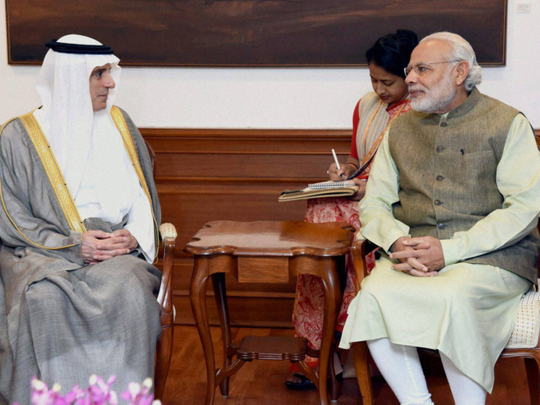
New Delhi: Saudi Arabia finds it difficult to maintain good relations with Iran because of Tehran’s policies, the kingdom’s Foreign Minister Adel Al Jubeir said on Tuesday.
“Relations with Iran are difficult because of its policies,” Jubeir told IANS during the course of an interview.
According to Al Jubeir, though Riyadh has been trying to develop good ties with Tehran since the time of the Iranian revolution, it has been difficult because of the policies of that country’s government.
“We have tremendous respect for Iran’s culture,” he said.
“But Iran’s government is following a policy of sectarianism. It has a policy of interfering in the matters of other countries.”
The Saudi foreign minister said that unless Tehran changed its policies, it would be difficult to deal with Iran.
Diplomatic relations between Riyadh and Tehran were cut off after Saudi Arabia executed a Shiite cleric in January this year.
The execution of Nimr Al Nimr, a Saudi national, created a volatile situation in the Middle East with the Saudi missions in Iran coming under attack and Riyadh cutting off diplomatic ties with Tehran.
Al Nimr was among 47 people executed on terrorism charges.
As protests broke out in Iran, Saudi Arabia maintained that the executions reflected the Gulf nation’s determination to combat terror.
According to a statement issued by the Saudi embassy in New Delhi, Nimr Al Nimr “was involved in inciting people, recruiting people and providing weapons to people”.
“He was involved in attacks against security personnel and police stations that led to the killing of innocents,” it stated.
Al Jubeir was on a daylong visit to New Delhi as part of the preparations for Prime Minister Narendra Modi’s visit to Saudi Arabia early next month.
He held meetings with Modi as well as External Affairs Minister Sushma Swaraj before departing for Riyadh Tuesday afternoon.
During his first visit to India, Al Jubeir discussed with Sushma Swaraj the entire gamut of bilateral relations as well as regional and international issues of mutual interest, the external affairs ministry said in a statement.
“India and Saudi Arabia share friendly relations based on close people-to-people contacts,” the ministry stated.
“The ‘Strategic Partnership’ that our two countries established in 2010 envisioned a deeper engagement in political, economic, security and defence areas through the Riyadh Declaration.”
Modi’s two-day visit from April 2 on his way back from the US will be the first by an Indian prime minister to Saudi Arabia after then prime minister Manmohan Singh’s visit in 2010.
Modi’s visit assumes significance in the face of the current regional situation and strained relations between the kingdom and Iran, another strategically important country for India.
Apart from being India’s largest crude oil supplier accounting for one-fifth of the imports, Saudi Arabia is also India’s fourth largest trading partner with bilateral trade reaching $40 billion.
Indo-Saudi Arabian ties got a fresh boost during then King Abdullah’s visit to New Delhi in 2006 which resulted in the signing of the “Delhi Declaration”.
The reciprocal visit by Singh in 2010 raised the level of bilateral engagement to “Strategic Partnership” and the “Riyadh Declaration” signed during the visit captured the spirit of enhanced cooperation in political, economic, security and defence realms.
In February 2014, during the visit to India of then crown prince and now King Salman Bin Abdul Aziz, a joint statement was issued.
In November 2015, on the sidelines of G20 meeting in Antalya, Turkey, Modi met with King Salman and discussed areas of bilateral interest.
During his visit next month, Modi is expected to discuss with the leadership of one of the most powerful Arab countries key bilateral and regional issues, including trade and energy.
Saudi Arabia is also home to nearly three million Indian expatriates, most of whom are blue collar workers.










